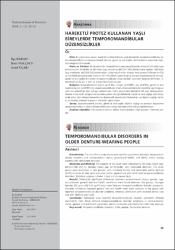| dc.contributor.author | Baran, İlgi | |
| dc.contributor.author | Nalçacı, Rana | |
| dc.contributor.author | Uçar, Sedef | |
| dc.date.accessioned | 2021-01-14T18:19:38Z | |
| dc.date.available | 2021-01-14T18:19:38Z | |
| dc.date.issued | 2008 | |
| dc.identifier.issn | 1304-2947 | |
| dc.identifier.issn | 1307-9948 | |
| dc.identifier.uri | https://app.trdizin.gov.tr/makale/TVRBMU1qYzFOUT09 | |
| dc.identifier.uri | https://hdl.handle.net/20.500.12587/13771 | |
| dc.description.abstract | Giriş: Bu çalışmanın amacı, hareketli protez kullanan yaşlı bireylerde temporomandibular eklem düzensizlikleri ile sosyo-ekonomik durum, genel ve oral sağlık, dental durum arasındaki ilişkilerin değerlendirilmesidir. Gereç ve Yöntem: Bu araştırmada hareketli total veya parsiyel protez kullanan 52 kadın (yaş ortalaması 61.44±8.06) ve 48 erkek (yaş ortalaması 60.52±7.98) olmak üzere toplam 100 birey (yaş ortalaması 60.52±8.02) incelenmiştir. Çalışmaya katılan bireyler total protez kullanan (n=53) ve hareketli parsiyel protez kullanan (n= 47) olmak üzere iki grup altında sosyo-ekonomik durum, genel ve oral sağlık durumları temporomandibular düzensizlikler açısından değerlendirilmiştir. İstatistiksel analiz için t testi ve ki kare testi kullanılmıştır. Bulgular: Sosyo-ekonomik durum (p<0.05), cinsiyet (p<0.001), yaş (p<0.05), genel ve oral sağlık bulguları (p<0.001) ile temporomandibular eklem düzensizliklerinden özellikle ağrı bulgusu arasında anlamlı bir ilişki olduğu saptanmıştır. Daha genç kadın bireylerin (50 yaş) temporomandibular düzensizlik semptomlarına daha yatkın olduğu belirlendi. Genel ve oral sağlığı kötü bireylerde daha fazla temporomandibular düzensizlik problemleri bulunduğu ve dişlerin sağlığı ve/veya kullanılan protezin başarısını etkilediği saptanmıştır. Sonuç: Sosyo-ekonomik durum, genel ve oral sağlık, dişlerin sağlığı ve protezin başarısının temporomandibular eklem düzensizliklerinin varlığı üzerinde etkili olduğu belirlenmiştir. | en_US |
| dc.description.abstract | Introduction: The aim of this study was to evaluate the associations between temporomandibular disorders and socio-economic status, general-oral health, and dental status among patients with removable dentures. Materials and Method: The subjects of this study were 100 patients; 48 males (mean age: 60.52±7.98) and 52 females (mean age: 61.44±8.06), with removable dentures. The study group were evaluated in two groups; with complete (n=53) and removable partial denture (n=47) in terms of their socio-economic status, general and oral health and temporamandibular disorders. Statistical analysis included t- test and chi-square tests. Results: Statistically significant differences between socio-economic status, gender, age, occupational, general and oral health conditions were found between the groups. Younger females (50 years old) had significantly more frequent temporomandibular disorder symptoms. Variables related to impaired general and oral health were more common in the group with reported temporomandibular disorder problems, whereas satisfaction with received dental care and with denture was lower. Conclusion: Individuals who reported temporomandibular disorder symptoms differed significantly from those without temporomandibular disorder symptoms in socio-economic status, general and oral health symptoms, dental conditions and satisfaction with their denture. | en_US |
| dc.language.iso | tur | en_US |
| dc.rights | info:eu-repo/semantics/openAccess | en_US |
| dc.subject | Cerrahi | en_US |
| dc.title | Hareketli protez kullanan yaşlı bireylerde temporomandibular düzensizlikler | en_US |
| dc.title.alternative | Temporomandibular disorders in older denture-wearing people | en_US |
| dc.type | article | en_US |
| dc.identifier.volume | 11 | en_US |
| dc.identifier.issue | 1 | en_US |
| dc.identifier.startpage | 26 | en_US |
| dc.identifier.endpage | 32 | en_US |
| dc.relation.journal | Türk Geriatri Dergisi | en_US |
| dc.relation.publicationcategory | Makale - Ulusal Hakemli Dergi - Kurum Öğretim Elemanı | en_US |
















